Contents
Rosemary is an evergreen shrub found in Africa, Turkey and other southern regions. The plant has a decorative appearance, is used in medicine, cooking. Growing rosemary from seeds is one way to propagate this shrub. New plants are also obtained from cuttings, branches, by dividing the bush and layering.
How to propagate rosemary
There are several ways to propagate rosemary:
- Cuttings. In an adult shrub, the tops of the shoots are cut off. Then they are rooted in a special substrate. Cuttings provide a range of conditions that promote root formation. Prepared seedlings are planted on the site.
- Seeds. With this method of reproduction, it is important to prepare planting material and soil. To increase the germination of seeds, they are subjected to processing. Seedlings are constantly looked after, a special microclimate is created in the room. When the bush grows up, it is planted on the street.
- Twigs. The cut branch is kept in warm water. When the roots appear, the plant is planted in a pot or on the street.
- By dividing the bush. The propagation method is used when transplanting rosemary. Its rhizome is divided into several parts, then planted in the right place.
- Layers. A branch of rosemary is bent down and covered with earth. With intensive watering and top dressing, roots appear at the shoot. Then the plant is transplanted to the site.
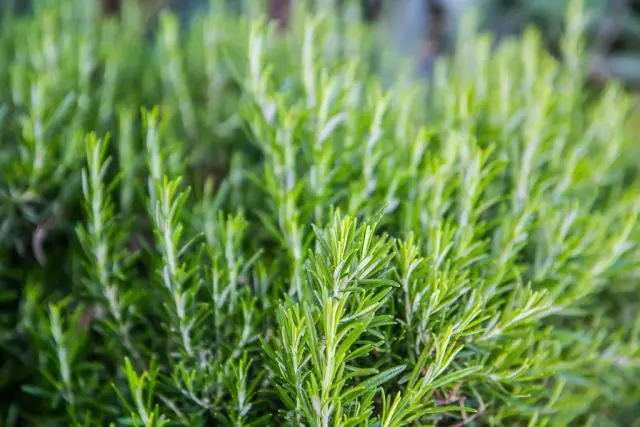
How to propagate rosemary from cuttings
The stalk is the upper part of the shoot of the shrub. It is cut from adult plants, bought in the markets or in stores. For reproduction, a cutting 8–10 cm long, having 3–4 internodes, is sufficient.
How to plant rosemary cuttings:
- Containers and soil are prepared for planting. The substrate is bought in a store or obtained by mixing black soil, humus, peat and sand.
- Expanded clay or broken brick is poured at the bottom of the container, then filled with soil.
- Indentations are made in the ground and cuttings are planted to a depth of 3 cm. All leaves are cut off in the lower part.
- The soil is well watered. The containers are kept in a warm, lit place.
- When propagating a shrub, it is necessary to water the cuttings 4 times a week.
- After 1,5 months, the seedlings are transferred to a permanent place.
In the south, cuttings of rosemary are resorted to at any time of the year, with the exception of winter. In the middle lane, cuttings are prepared in September-October. In winter they are rooted, and in summer they are planted outside.
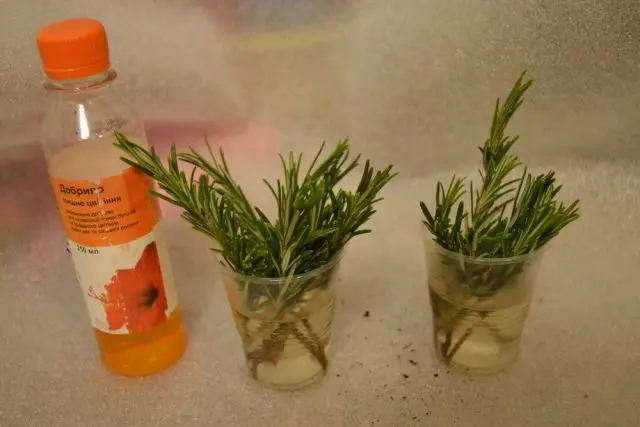
How to propagate rosemary seeds
Planting rosemary seeds is best in late February or March. For propagation, seedlings are used. Planting is carried out at home, then the seedlings are transferred to the ground.
Before you start propagating rosemary, it is important to prepare containers and substrate. For planting, choose pots with a height of no more than 15 cm. A layer of expanded clay or other drainage is placed on the bottom. The containers must have holes.
Soil for rosemary is prepared independently or buy a ready-made mixture. The best option is to mix garden soil with river sand and compost in a ratio of 2:1:1. Any soil with neutral acidity for indoor plants is also suitable.
Rosemary seeds are very small and take a long time to germinate. To improve germination, they are processed. First, planting material is kept in water. When the seeds swell, start planting.
The order of propagation of a plant by seeds:
- Tanks with drainage and soil are watered abundantly.
- Seeds are distributed on the ground. A layer of earth no more than 0,5 mm is poured on top.
- Landings are watered with warm water using a sprayer.
- The container is covered with polyethylene and placed in a warm place.
Seedlings appear at a temperature of +25 oC. Turn the film over regularly and remove condensation from it. To prevent the soil from drying out, every 2 to 3 days the soil is moistened with a spray bottle. The first sprouts appear in a month. Then the film is removed and the containers are moved to a lighted place. On average, when propagating rosemary seeds, seedlings wait 6 to 8 weeks.
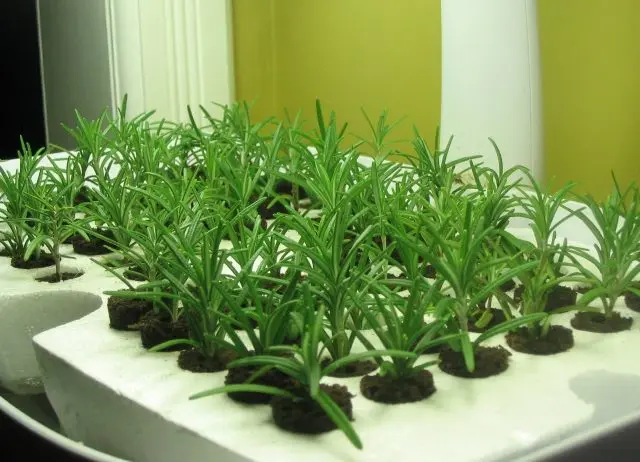
It is not enough to plant rosemary with seeds, it is important to provide good care for the seedlings. The containers are rearranged on the windowsill. The room temperature is maintained from +18 oC.
When rosemary seedlings have the 2nd or 3rd leaf, they dive into separate containers. Use soil of the same composition as when planting seeds. When transplanting, try not to damage the root system.
When the seedlings reach 3 – 4 cm in height, they begin to harden it. First, open the window and ventilate the room. Then they transfer containers with seedlings to a balcony or loggia. Before planting in the ground, plants must fully adapt to natural conditions.
Bushes 7-8 cm high are planted in a permanent place. A sunny place, protected from cold winds, is chosen for them. The best soil for rosemary is light, fertile and well-drained. Seedlings are transplanted into the ground in May-June, when frosts pass and warm weather sets in.
How to grow rosemary from a twig
A large rosemary bush can be successfully grown from a twig. It is best to choose young shoots 5 cm long. They are cut from an adult bush. I use this method of reproduction at any time of the year. The twig is rooted at home.
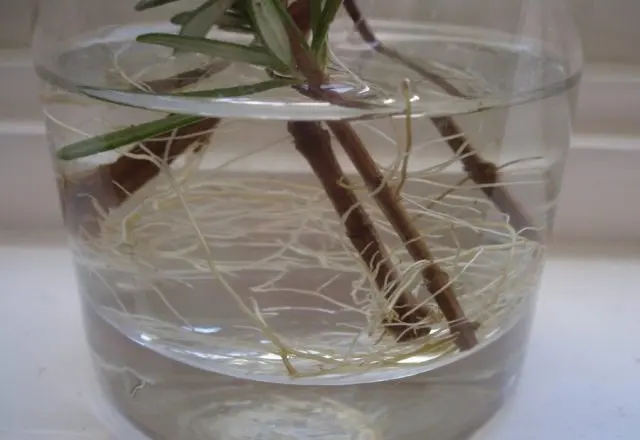
The procedure for propagating a shrub with a twig:
- The cut shoot is placed in a jar of water. A root growth stimulator can be added to the liquid.
- Every 3 days the water is changed.
- When the branch has roots, it is placed in a container with light nutrient soil.
- Rosemary is moderately watered, kept in a warm and lit place.
When the seedlings grow up, they are planted on the site or left in a pot. You can root rosemary with branches in a greenhouse, where the necessary microclimate is provided.
Reproduction of rosemary by dividing the bush
If rosemary is already growing on the site, it is propagated by dividing the rhizome. This method is used when transplanting a bush. Every year, a bush over 5 years old needs rejuvenation. By transplanting, you can not only rejuvenate the plant, but also get new seedlings.
The need to transplant rosemary also arises when the shrub grows in the wrong place: it lacks moisture or sun. It is recommended to carry out this procedure in cases where the shrub is in a lowland or suffers from excess moisture in the soil.
Work is carried out in spring or autumn, when sap flow slows down in plants. As a result, the shrub tolerates planting better and takes root faster in a new place.
Instructions for propagating rosemary by dividing the bush:
- The shrub is dug out of the ground or taken out of the pot.
- The roots are cleaned from the earth and divided into parts. Use a pruner or other tool that is pre-disinfected.
- Each seedling should have several roots and shoots. If there are old, diseased or dried branches, they are removed.
- Places of cuts are treated with charcoal.
- The roots of seedlings are immersed in water with the addition of a growth stimulator.
- It remains to plant rosemary in containers or on a bed.
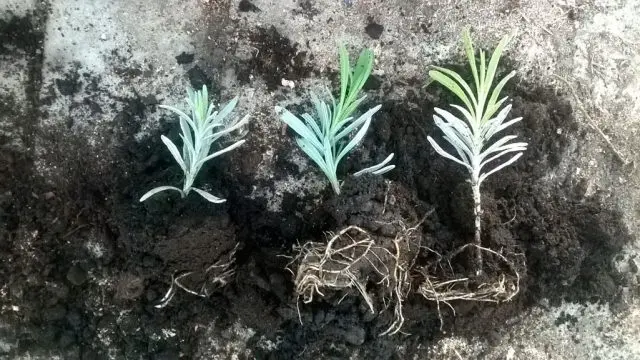
How to propagate rosemary by layering
Rosemary is conveniently propagated by layering. The procedure is performed in the spring. To do this, choose 2 – 3 of the strongest shoots. Furrows 5 cm deep are dug under them. The branches are lowered down, fastened with metal brackets and covered with soil. Part of the layering should remain above the ground. Then the shoots are watered abundantly.
Mineral complexes are used for top dressing. Mullein infusion and other natural remedies are used at the beginning of the season. An excess of organic matter inhibits the development of rosemary. Fertilizer is applied 2-3 times a month.
By autumn, the cuttings will take root well. They are separated from the mother bush and seated around the site. In cold climates, it is better to transplant the cuttings into pots for the winter, and move them outside in the spring.
Which way is better
The choice of propagation method for rosemary largely depends on the initial data. The timing of the work is chosen taking into account the weather conditions in the region. If the shrub has not yet been grown, then it is better to purchase seeds or cuttings. If the plant is already on the site, then choose the propagation of rosemary by cuttings or layering.
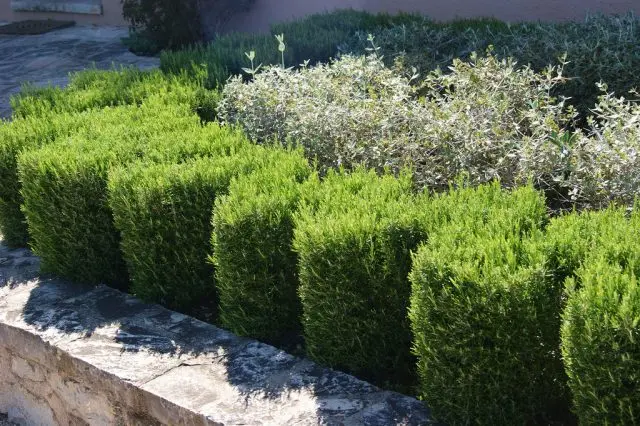
The most popular method of propagation is cuttings. The division of the bush is recommended during transplantation in order to injure the plant less. These are reliable methods in which all varietal characteristics are preserved. Reproduction by layering is more suitable for shrubs growing in the garden. At home, it is better to choose other methods.
Propagation by seeds is the most labor-intensive method. To obtain healthy seedlings, it is important to use a good substrate, care for the seedlings and create a microclimate for them. When using seeds, the plant may lose varietal characteristics.
Conclusion
Growing rosemary from seeds is not an easy process that requires careful preparation. First prepare containers, soil and planting material. To get seedlings, you need to create a certain microclimate at home. Rosemary is also propagated by cuttings, layering, and other methods.









